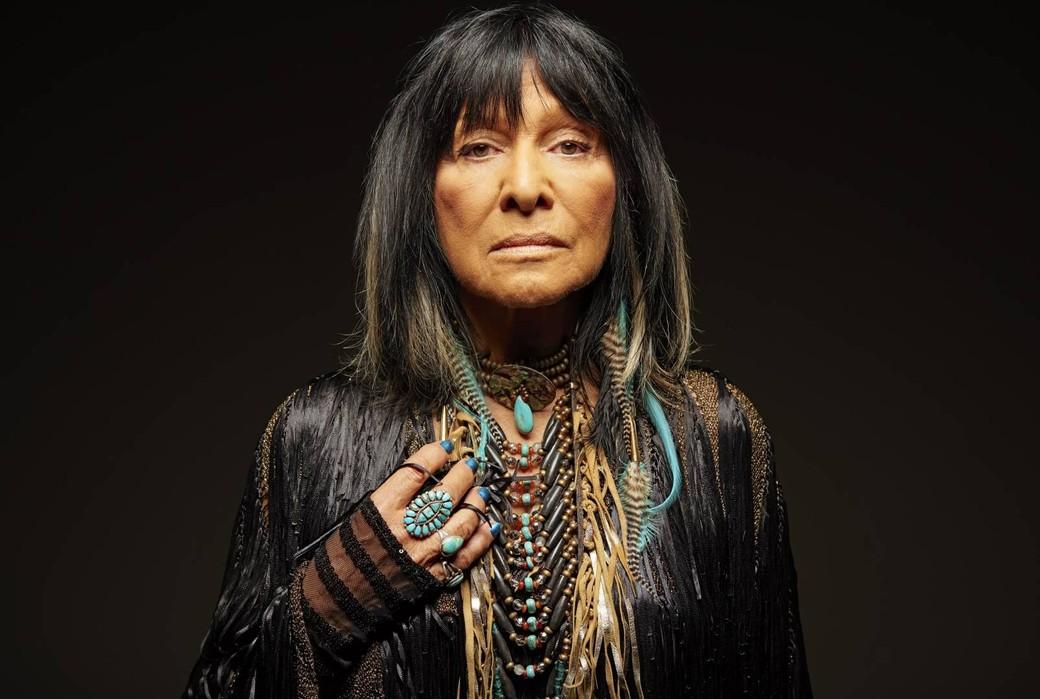
JUNO Spotlight: Buffy Sainte-Marie
Honoured with:
2017 Allan Waters Humanitarian Award
This year's Allan Waters Humanitarian Award recipient Buffy Sainte-Marie doesn’t believe in burning out. Seeing her live you'd think the flames were burning brighter than ever! It’s been 50 years blazing down the road and there’s still a fiery power rushing in her blood. It courses through her veins as a drive to create, to change and to challenge.
“I'm paying attention, trying to stay informed, continuing to reduce-reuse-recycle, protest the racketeers, help with certain issues when I can like everybody else,” she told Ottawa Life last year while touring for her most recent release, Power in the Blood.
“As an artist and activist I can help by creating and distributing information that encourages positive change.”
Born in 1941 on the Piapot Plains Cree First Nation Reserve in the Qu'Appelle Valley of Saskatchewan (she was later orphaned and adopted by a Massachusetts family), the now 76-year-old musician has also been heralded as a folk music icon and advocate for Indigenous people. It was the discovery of her Cree roots later in life that sparked the flame of her creativity, and since then she hasn’t looked back.
Though she had had a few piano lessons growing up, Sainte-Marie started playing guitar when she was 17. She’d write her first songs on family vacations but it was inside the coffeehouses of Toronto’s Yorkville district and New York's Greenwich Village in the early 60’s where her themes of love, nature and human oppression began to take shape. Over her five decade and rising career she continues to walk the path her way, clearing away the stones of addiction and having her music blacklisted by the American government to move forward at her own pace.
“I had no reason to want to copy anybody else,” she once said. “What I wanted to give audiences for the few minutes that I thought my career would last was something unique.”
Where some might lose momentum, Sainte-Marie continued to thrive after taking a 16-year hiatus in order to raise her son; she has now become one of the most decorated Canadian musicians of our time.
“No need to hurry the moon,” she says.
Still, with all her accolades, including this year's Allan Waters Humanitarian Award, Sainte-Marie was surprised when she was recently handed another. Power in the Blood was awarded the 2015 Polaris Music Prize, an honour she didn’t expect to win. The album is a powerful statement of those themes she continues to revisit, and with a sound that often seems more akin to what you’d hear at an electronic music festival instead of a folk fest, the work showcases Sainte-Marie’s ability to shift musical directions while simultaneously serving as a rebirth for some of her older tracks.
Despite the voice that wails as much as it soothes, and one that continues to speak out against what she feels is wrong in the world – be it the lack of female JUNO nominees or the progression in reversing climate change– Sainte-Marie, who now resides in Hawaii, tells Ottawa Life that she cherishes her quiet existence surrounded by farmland and animals.
![]() ?Ottawa Life: Can you tell me about some memorable performances here in Ottawa that stand out for you over your career?
?Ottawa Life: Can you tell me about some memorable performances here in Ottawa that stand out for you over your career?
Buffy Sainte-Marie: As a young songwriter in the 1960s, I used to play at Le Hibou and it was always great. Over the years I came to Ottawa many times privately to meet with others regarding the arts or Aboriginal issues, and I'd always drop in at the Museum of Civilization especially to look at their photo archives. During these same years I did concerts and Cradleboard presentations at Carlton University (always loved the people at that school!) and in 2008 they honoured me with a Doctor of Laws degree. I did a concert with the National Arts Centre Orchestra in 1997. It was gorgeous with a "roaring standing ovation". Since the early 1960s I had researched and written about various issues of genocide and was glad to help out a little in bringing Truth and Reconciliation to public awareness via speeches and music, including the closing concert about a year ago. In September of 2015, the Ottawa's Writers' Festival presented a dynamite public conversation hosted by CBC's Alan Neal wherein we and the audience discussed the deeper meaning behind lots of my songs.
You were playing a few jazz festivals last year. Some might not refer to your music as fitting the genre, but do you have any personal jazz influences that have inspired you over the years?
Although I made my first records on Vanguard, the other label I almost signed with was Blue Note believe it or not –a jazz label. Songs on my early records like “Maple Sugar Boy”, “Broke Down Girl”, “Cod’ine”, and even the very pop “Until It's Time for You to Go” had attracted some real jazz musicians because of the uniqueness of the songs. Chet Atkins, Cannonball Adderley, Miles Davis, Merle Saunders, Nina Simone, Roberta Flack all had nice things to say. More recent songs like “To the Ends of the World” (which I wrote for a brass quartet) and “When I Had You” on the CD Running for the Drum and a few others I haven't recorded have a distinctly jazz fragrance –very musician-y, unusual progression of chords which come naturally to me as opposed to having discovered them in music school. I'm dyslexic in music, never have been able to learn to sight read, and although I can improvise with the best, I would call myself a lucky beginner when it comes to jazz. My own favourite jazz musicians: Miles Davis and Gil Evans together or separately, Barney Kessel, Julie London, Dave Brubeck, Nina Simone, Billie Holiday, Amy Winehouse, and Jon Hassel.

![]() ?You recent album, Power in the Blood, continues to explore themes you have touched upon your entire career. Why do you feel you keep returning to these central themes in your music?
?You recent album, Power in the Blood, continues to explore themes you have touched upon your entire career. Why do you feel you keep returning to these central themes in your music?
I tend to write about universal themes but from personal points of view. Not deliberately, but I seem to be interested in the same issues that have inspired artists for centuries: love, oppression, a good story, Nature, the sacred.
Speaking of Power in the Blood, it is a really powerful album with a very unique sound. How have you continued to change your music up over the years?
I don't actually try. My having a career at all is pretty much a miracle based in the same things I did as a child. I've always seen lots of different movies in my head about any issue I care about, and it all turns into songs, like snapshots of my own reality. I'm interested in the world and travel a lot, and as a songwriter I sometimes write like a journalist. Be concise, be easy to understand within a limited space and time (column space, or 3' 30" song length). From 1975-1981, I honed these same songwriting skills in another way on Sesame Street, where we were dealing with short attention spans, and three and a half minutes is the perfect framework for expressing any idea.
Regarding changing music to "fit the market", that's not something I've tried to do. My albums are always very diverse in styles (whereas the big money seems to be in making 12 similar songs written in the formula of the latest teen hit). The challenge for me has been in getting my own hands on the controls so that the audience hears the songs like they sound in my head. For Power in the Blood I flew around North America interviewing seven producers, to whom I gave a playlist of my home demos. I chose three unique producers, and asked each person to choose which songs they wanted to work on with me: Chris Birkett (with whom I'd already made three other albums) recorded in his own little Toronto studio; the divine Jon Levine who's a god in the pop world recorded me at the Orange Room in Toronto; and Michael Wojawoda who recorded me at Revolution Studios in Toronto, and also mixed the final collection so that it flowed sonically even though it had been recorded in different places with different musicians and producers. I was pretty clear about how I wanted the album to sound: right in your face Amy Winehouse pop clear and playable on the radio.
From what I read, some of the songs were actually first recorded during those blacklist years?
It's true. Several very strong songs are re-dos that had never gotten airplay at the times of their original releases, but we were having fun with them onstage. Concert audiences loved them night after night but couldn't find them amongst the hundreds of songs I'd recorded.
When Geoff Kulawick of True North Records approached my manager Gilles Paquin about "Does Buffy feel like making a record", the timing was perfect. I'd been all over the world with my touring band and we were doing songs off Running for the Drum plus our classics, and these obscure giants that audiences loved whenever they heard them and couldn't believe were old. The songs “It's My Way” and “Generation” and “Carry It On” were about thirty years too early and got drowned with the rest, but on Power in the Blood they finally reached a comfortable audience.
![]() ?You mentioned “It’s My Way”, an old favourite on the new album. Why did you choose to revisit it?
?You mentioned “It’s My Way”, an old favourite on the new album. Why did you choose to revisit it?
I'd been singing it onstage for 50 years. People would ask about it, wonder where they could find it, now they can.
Where were you when you heard you had won the Polaris Music Prize?
I was in Toronto at the Polaris Gala! Everybody got the news at the same moment. I was really, really surprised, as I'd listened to all the albums and didn't think I had a chance. Very exciting! I'm really very grateful to all who liked and supported this album, especially the Polaris judging teams, and True North Records who got the album played all over the place.
I heard an interview with you where you once said: “I don’t believe in burning out.” That’s a powerful quote. You do keep moving forward, shifting with the times while still maintaining your roots. What is the key to your endurance and longevity?
Yeah, my best prescription: a bed and a bath, it's true. I work out (like a girl, not a jock) and that makes a huge difference in my whole life including attitude, writing, staying home, playing, touring. And I don't eat too much stuff that I think isn't good for me. Also I drink zero alcohol. In other words I have good health and I maintain it the best I can. If I get hurt or sick I recover fast.
I've never been afraid to take time off for my so-called career, took off 16 years to raise my son, went in and out of “le Show Biz” a few times. In other words I've lived a real life beyond my career and that keeps me happy, at home and on the road. Time off for me is on a farm with lots of animals, and eating fresh from the garden. Also, what I call Ripening: variety, diversity, mutation, uniqueness, evolution are hot topics for me. Everybody and every cell in every living thing is ripening every second, and that doesn't scare me. No need for pressure. No need to rush the river. No need to hurry the moon.
Recently, climate change has become an issue you have been passionate about. The song “Carry It On”, for example, reflects this. How do you feel we have been advancing to rectify this concern and what else do you think can be done?

The verse says: "Life is beautiful if you've got the sense to take care of your source of perfection. Mother Nature, she's the daughter of God and the source of all protection. Look right now and you'll see she's only here by the skin of her teeth as it is, so take heart and take care of your link with life, and carry it on."
We've come a very long way in a short time in that millions more people are aware of climate change now than there were last year, or the year before, or even last week. What can be done? I'm paying attention, trying to stay informed, continuing to reduce-reuse-recycle, protest the racketeers, help with certain issues when I can like everybody else, hoping real experts will present doable options that I understand and can support. As an artist and activist I can help by creating and distributing information that encourages positive change.
You have been an activist for over five decades. Have you viewed much progress over the generations when it comes to environmental awareness as well as some of the other issues that are important to you?
I see this little history both as an optimist and as a pessimist. As an optimist I'm thrilled that there are lots of people more aware and committed to positive change than there used to be. This is huge because we are the ones who need to stay on the case. But I'm bummed that the usual uptown racketeers still horn in on any movement, monetize everything, turning the world to pocket change, jockeying for position, money and attention, and wanting to control the whole show themselves. I'm real sick of exhibitionists who can't make it in show business turning to politics in an effort to get some attention.
?Earlier you mentioned your time on Sesame Street. I am one of many who were raised on the show and I still recall your breast feeding segment that re-ran periodically in the '80's. How did you approach the show to do this segment? Certainly, this was far more controversial then than it is today?
No it was not controversial at all! That's only recent. Somebody puts it online and somebody else takes it down now and then, and somebody else puts it back up. And it was a real easy sell since I was discreetly breast feeding my new baby on the set, in my dressing room, at lunch – wherever – and everybody was used to it. I loved the way Big Bird just took it in stride, as a normal five year old would do, then went back to playing. Perfect!
What does Cody think of the segment now?
A little proud now that he's grown up, I think. It's never seemed a big deal to him. He went all the way through school and nobody ever made it an issue.
You were very adamant on the lack of female nominations for the JUNOs in the past. What do you feel is the issue and why aren’t more women being recognized for their work?
Actually the question just needed to be asked, again, as several other women artists had already brought it up strongly online, and no better place or time to do it than at the pre-Junos events, in casual conversation with CARAS people. I think we need more women to become part of calling the shots if we want to reflect an accurate picture of women in the recording industry. However, it doesn't seem that anybody is trying to keep us out; it's more that we haven't known where the door is until now, and I hope that lots of women artists and other female recording professionals jump on this opportunity. If you go to the CARAS Juno website you can read about becoming a member, serving on a committee, judging etc. This is the perfect time.![]() ?
?
 What perpetuated your move to Hawaii and how are you finding life there?
What perpetuated your move to Hawaii and how are you finding life there?
I've lived in the same rural place in the mountains for over fifty years. I came after I'd almost missed a concert because of Regina weather, and I was totally sick of L.A. fame and the record business in general. Hawaii adds half a day to any trip to anywhere, very inconvenient, but I was looking for solitude and a reasonable airport. There are drawbacks but I like the quiet life with animals all around: a cat, a horse, a bunch of goats, countless chickens some of them tame, and four big herds of very naughty wild boars on my place at the moment.
What is some of the advice you would share with up-and-coming musicians?
Keep it playful. Don't just work and practice or you'll sound like a fast and accurate drudge.
Play, play, play. Play anywhere, everywhere, for anybody. Don't be a snob; a listeners' time is precious. Get over using those same four chords you discovered in high school. Play new chords, progressions, styles, and especially rhythms. Listen to all genres: opera, Chinese music, heavy metal, music from far away places, uptown, downtown, everywhere. Go have fun at a music festival. If you have fun with music, you'll want to play more.













